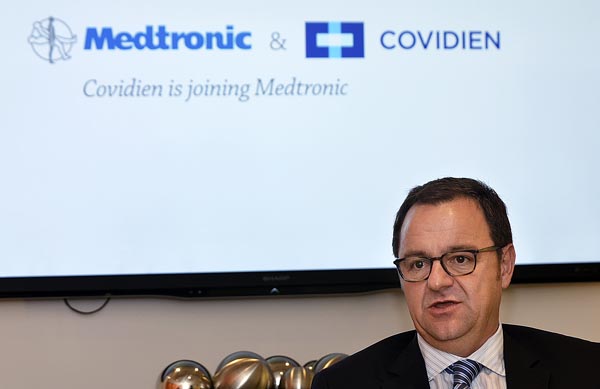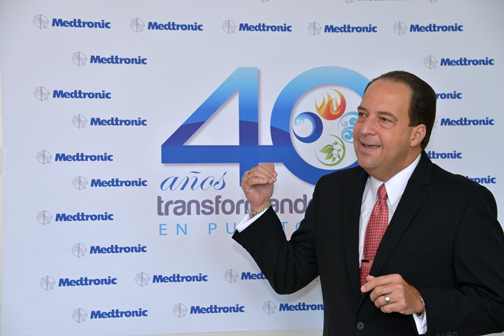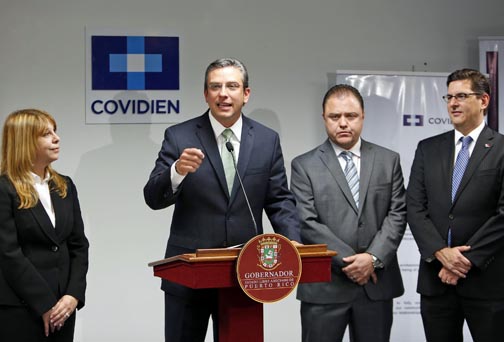Execs: Medtronic/Covidien integration will take 3 years

Less than two months after the completion of the merger between Medtronic and Covidien, two powerhouse medical device companies with operations in Puerto Rico, top-level executives confirmed that the integration process will take about three years to complete.
As a result, any talk about a potential negative impact on local operations and employees is “premature,” said Felix Negrón, vice president of Medtronic Puerto Rico Operations Co. during an interview with this media outlet on Tuesday.
“The concern is valid, but discussing the impact it may have is premature,” he said.
The $50 billion merger of the two companies was completed in late January, after several months of negotiations that took place last year. The unified company, now known as Medtronic plc., employs about 4,000 people in Puerto Rico, split between manufacturing and commercial operations.
Another consideration that seems to tip the scale favorably toward stability for Puerto Rico is the reality that the two operations manufacture complementary medical device products. That, and the fact that the island serves as a hub for the Caribbean, executives said.
“Puerto Rico is a major pillar for the companies on a global level,” said Hugo Villegas, president of Medtronic’s Latin American region, who was present for the interview. “The joining of these two major companies is interesting and powerful because we have portfolios that don’t conflict. Covidien’s plans continue moving forward at the same pace as before the merger.”
The “very different” portfolios, he said, come together to cover more health areas, expanding the company’s reach into the sector.

Richie González, area director for Covidien’s Caribbean and Central American region. (Credit: Mauricio Pascual)
‘Improve quality of life’
Medtronic sees “great opportunities” in Puerto Rico, which for decades has been an important market for both operations, Villegas said.
“As Medtronic, we want to see how we can improve the quality of life for Puerto Ricans by providing the most advanced technologies in health, at reasonable costs,” Villegas said. “We’re looking to enter into partnerships with hospitals or governments to find ways to control the rising healthcare costs seen worldwide.”
“We want to go beyond providing excellent products and solutions, and find ways to help bring down those costs,” he added. “We also want to find ways to collaborate and become part of the solution. We want to share strategic objectives so that Puerto Rico remains attractive for investment.”
As part of that strategy, Medtronic is looking to replicate in Puerto Rico what it has done in other Latin American countries, where it has partnered and made “important investments” with hospitals to improve efficiencies by providing equipment designed to optimize procedures such as surgeries.
“We’re doing that in Colombia, Mexico and Argentina,” he said, noting that by collaborating with hospitals, both the entity and patients benefit from better, more accessible healthcare. “It’s not just about helping them through the analysis but also teach them methodologies so they can optimize their operations.”
Richie González, area director for Covidien’s Caribbean and Central American region, said the company has presented its programs to the Puerto Rico Hospitals Association, to set the foundation for future hospital improvements.
“We already work with the public sector as part of our commercial responsibilities, supplying products and helping health systems to improve based on technology and new product advances by Medtronic,” he said. “From the beginning the relationship has been good because we’ve always been focused on our health professionals and patients.”
The company provides everything from simple bandages to cutting-edge equipment for cardiovascular and respiratory treatments, he said.
Establishing those partnerships with hospitals is part of several “priorities” Medtronic is managing, but giving patients access to technology is first on that list, Villegas said.
“We have a team working on agreements with hospitals throughout Latin America, so we aren’t putting a date on when that could happen in Puerto Rico. But, it could happen within a year,” he said.
Economy is a concern
Despite Puerto Rico’s compromised economic condition, Negrón said the fact remains that the expertise gained from the local employee base is an important consideration for the company.
“That doesn’t mean that things could change in the future if external pressures continue to come up,” he said, when asked about Medtronic’s thoughts on the protracted economic depression and the proposed tax reform that calls for a value added tax structure.
“We have an investment in employees, technical competencies, and commercial staff that positions us well,” he said. “The plants have done a good job over the years in controlling productivity to remain competitive.”
And while the company is able to manage its internal production levels according to conditions, the same cannot be said about what comes from the outside that may influence the cost of doing business in Puerto Rico.
However, Negrón said Medtronic’s standing within the island’s manufacturing community, and as a member of the Puerto Rico Manufacturing Association and the Pharmaceutical Industry Association, it is able to participate in the public discussion and the decision-making process.












Medtronics performed an inversion. That is, it switched its home office for tax purposes from the US to Ireland. This is a momentous change. In terms of income taxes on medical devices operations, Ireland is more competitive than Puerto Rico.
In addition, Federal tax credits for taxes paid to Puerto Rico under Law 154 apply only to sales from the Puerto Rico operation to the US. On the other hand, sales from Puerto Rico to Ireland, where the new home office is located, do not get such credit.
The outlook for the operation of these two companies in the Caribbean island of Puerto Rico is not as good as the outlook for these same two companies in the European island of Ireland.